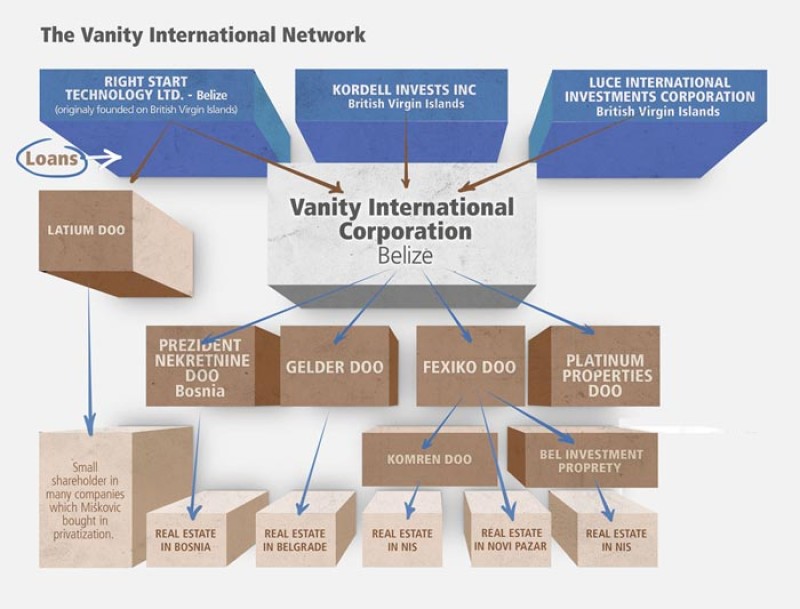Hardly a Serb goes a day without walking past Miroslav Mišković’s property or shopping in his grocery stores. In the two decades since he left the vice presidency under Slobodan Milošević to take over the Delta company in 1991, Mišković’s holdings have expanded to Bulgaria, Montenegro and beyond, making him among the richest, most powerful men in the Balkans.
It has also made him the target of Serbian regulators who spent years fruitlessly sorting through his known offshore companies based in Cyprus. The state anti-corruption council issued a blistering report in 2008 accusing Delta and its corporate head, Hemslade Trading, of fraudulently underestimating the value of assets in its takeover of the Port of Belgrade, but a special prosecutor for organized crime took no action.
The Organized Crime and Corruption Reporting Project (OCCRP) has uncovered a second group of offshore companies formed in the Caribbean and Central America and operating out of Delta headquarters in Belgrade. Headed by Vanity International of Belize, the offshore companies own at least €50 million worth of property and businesses in Serbia and Bosnia-Herzegovina (BiH), land registry records show. The companies have taken large stakes of Univerzal Banka (Universal Bank) in apparent violation of banking laws and are directed in every case by employees and lawyers of Mišković’s Delta Real Estate group, according to corporate records tracked down from six countries.
Vanity and Delta partnered to buy or form at least five companies in Serbia and BiH, according to business registry records. In addition, Delta is a majority partner in seven Serbian businesses owned by another Belize company, Right Start Technology.
Right Start’s director was Adem Hamza, who was an executive of Delta Holding in Moscow, according to Belize court records and Delta business documents. In 2007, Right Start loaned Vanity €6.3 million in a transaction run through the British Virgin Islands and prepared by Mišković’s law firm, loan document show.
It is one of three loans Vanity received from offshore companies in the period when it began buying property in Belgrade and forming its partnerships with Delta. The three companies also have taken sizeable stakes in Universal Bank through subsidiaries.
(See accompanying story)
The sea of companies and offshore entities – some well hidden, others operating in plain view to any investigator intent on finding them – vividly detail how one businessman with brains and connections in the highest level of government can build an empire. And the records and years of failed investigations also show how once that empire is in place, few are willing to stand against it, critics who have investigated Mišković said.
”You don’t have independent institutions which can guarantee the rule of law in this country. And that’s because the tycoons are the ones who create the government,” said Verica Barać, president of the anti-corruption council, which investigated Mišković and partner Milan Beko’s takeover of the Port of Belgrade and C Market, a grocery chain.
”We have cases that stretch through several governments; ministries and prime ministers change, but the cases (sit idle),“ she said. ”If you are a Mišković … it doesn’t matter what the law says, because it doesn’t apply.”
At the center of the shadow companies aligned with Delta is Vanity of Belize, a Central American state named as one of the world’s largest money-laundering havens, according to a report by the G-20 group of top industrialized nations.
Since May 2007, Vanity and Delta M (later Delta Real Estate) have been partners in Gelder of Belgrade, which owns an abandoned cotton factory on 69 acres along the Danube River estimated to be worth €11 million, according to business registry and land records. One month later Vanity partnered with Delta M and a Bosniak politician, to create Prezident Nekretnine (President Real Estate), a property company, according to business registry records in Sarajevo.
Shares of Vanity in 2007 were put into a trust for one year on behalf of Oleg Ezhov, a lawyer who until December of 2008 worked for Mišković’s Cyprus law firm, according to a trust declaration filed in Belize. Belize law protects the identity of offshore owners and provides no details of who is ultimately behind Vanity.
Business registry and land records, along with interviews with employees and businessmen show that members of Delta’s organization worked directly on behalf of Vanity in every Serbian transaction.
The Land Purchases
OCCRP has obtained copies of power of attorney designations given by Vanity in Belgrade, Sarajevo and Belize, along with proxy voting authorizations, director lists and minutes of shareholder meetings. In each document reviewed, Delta group employees or lawyers were given powers as trustee or director when Vanity took possession of the companies.
For example, Nemanja Mićanović, the head of property and legal affairs for Delta Real Estate and board member of TPK Deva, was named director and legal representative of Vanity’s Fexiko in 2007, according to corporate records and documents filed with the business registry. At a June 23, 2009, meeting of TPK Deva, which is owned primarily by Delta, shareholders agreed to use an office owned by Delta as collateral to help Fexiko obtain €1.4 million in bank financing, meeting minutes show.
Ljiljana Jevremović-Svilanović, another Delta Real Estate employee who was board member for Mišković’s Bazar shopping mall in Novi Sad, got power of attorney on Sept. 13, 2007 from Vanity International to act on its behalf in transactions involving Gelder.
And Petar Rajačić, an engineer for Delta Real Estate living in Belgrade, was given proxy authorization to ”act on behalf of the Company Vanity International,“ on Jan. 14, 2009, according to corporate records filed in Belize City. Rajačić was also a director and legal representative for Gelder in 2007.
Fexiko and Gelder are registered at the headquarters of Delta’s C Market and of Delta Holding, respectively.
Sharing Addresses, Employees
In 2007, Vanity International purchased Fexiko from Ćerim Šemsović, a Novi Pazar businessman and former director of Football Club Novi Pazar, Serbian land records show. In three separate interviews, Šemsović said he sold Fexiko to Delta -- not Vanity.
Serbian business registry records also show that as soon as the sale was complete, Fexiko’s corporate offices moved from Novi Pazar to Delta’s Belgrade headquarters. Still, the business registry lists Vanity as Fexiko’s owner and makes no mention of Delta.
OCCRP reporters went to the Novi Belgrade office building listed as Fexiko’s address, but it was not on the directory of building occupants that includes the Japanese Embassy. The reporters left their phone number and message for Fexiko with a receptionist of the building. Thirty minutes later a secretary of Delta Real Estate called back and took a message on behalf of Fexiko.
No representatives of Fexiko called back.
Mišković did not respond to messages left at Delta’s corporate offices. OCCRP attempted to contact every Delta employee and attorney listed on company documents, but all except one could not be reached or refused to talk about their involvement in the transactions.
A longtime Delta employee given authority for Vanity decisions in Belize said in a telephone interview that all the transactions took place in Delta headquarters and were prepared by Delta attorneys. The employee added that trusted employees and colleagues routinely were asked to sign documents for offshore companies but had no actual role in running them.
The employee, who asked not to be named out of fear of retribution in the community, said there was no reason to believe anyone at Delta had done anything wrong. The Belize transaction and others the employee had been involved with were part of a larger network of at least 100 offshore companies operating out of Delta’s headquarters, the employee said.
OCCRP guidelines call for the use of anonymous sources only in rare situations. In this case, the employee provided information backed up by documents, and expressed a genuine fear of retribution because of Mišković’s status in the community.
The employee also spoke highly of both Delta and Mišković, and answered questions only when trying to explain why the employee’s name is featured so extensively on offshore documents.
“You get the assignment that you are the director of a certain company X, and then you have to do some technical stuff. They give you some papers to sign, but I’ve never been involved in the operational leadership of any company,” the employee said. “There was a bunch of offshore companies. At least 100.”
Asked why Delta would set up so many offshores, the employee became incredulous.
“What is your main problem that you don’t understand? It was done to avoid the law on protection of competition,” the employee said.
OCCRP also obtained British Virgin Island loan documents detailing Vanity’s €6.3 million loan from Right Start Technology, which was formed in the British Virgin Islands and moved to Belize in 2007. The documents for that loan and two others totaling an additional €2.85 million loaned to Vanity were prepared by the Andreas Neocleous law firm. Neocleous is the counsel for Cyprus-based Hemslade Trading, named by Delta as the parent of its entire operation.
The web of companies emanating from Vanity and Belize is dizzying in its complexity, according to court documents, company filings and financial experts who reviewed the material for OCCRP. Some analysts said Mišković’s offshore network, while extensive, was not illegal. Others, including Dijana Marković–Bajalović, the former head of the state anti-monopoly agency, said the companies did break state tax and monopoly laws.
Investigators who have spent years looking at Mišković’s empire agree on one thing.
“He just doesn’t want any people in Serbia to know that he owns all those companies,” said Marković-Bajalović.
During the building boom of the early 2000s, Mišković, like other powerful landowners in Eastern Europe, bought property and borrowed money at a breakneck pace. Eventually, the total bank debt and mortgages of Delta and other companies publicly connected to Mišković reached €1 billion, according to a review conducted by Miroslav Zdravković, an analysis for the National Bank of Serbia. Zdravković said that is based on his analysis of financial reports and balance sheets relating to Delta filed on the Serbian business registry.
Beginnings of Vanity
On Jan. 1, 2007, in the law offices of Arguelles & Company of Belize City, Vanity International Corp. was born. Vanity’s new director and secretary were actually lawyers in Arguelles. Orion Trust Corporation, also of Belize and working out of the same address as Arguelles, registered the new company.
On their websites, Arguelles and Orion each boast of the secrecy and lack of regulations found in Belize.
International Business Corporations can be filed in as little as 24 hours and are “subject to no reporting or filing requirements,’’ according to the Arguelles website.
For less than $3,000, anyone can hire Orion or Arguelles employees to become directors of a new company, obtain help in setting up a Belize bank account and, most importantly, avoid taxes.
And if foreign countries come looking to tax money earned by the offshore companies, they are out of luck.
“The Belize offshore company is not subject to any tax information exchange treaties with any country,“ Orion’s website said. Belize, under intense pressure from the G20 who named it as a money laundering haven, has started signing treaties to open up its records. The first will not take hold until 2012.
Less than a month after Vanity formed and halfway around the world, Novi Pazar businessman Ćerim Šemsović formed his own company, Fexiko. Šemsović owns several companies across the South of Serbia, and bought three properties through privatization.
Immediately after registering Fexiko, he transferred a Novi Pazar shopping mall worth about €3 million to the new company. The transfer is legal and used often by Serb business leaders, since property controlled by a company is not subject to taxes when sold.
And a sale came quickly. According to Belgrade company records, Vanity International bought Fexiko one month after the transfer of the property was completed. Šemsović said in three separate telephone interviews with reporters that he actually sold Fexiko to Delta, with no middleman and no mention of Vanity.
Šemsović is familiar with Delta. Security Commission Clearinghouse records show that Sloboda is majority owned by Šemsović and Apsolut Property, another Mišković entity owned by Delta.
As soon as the sale of Fexiko was complete, the company was moved to Delta’s Belgrade offices and members of Delta’s management were appointed to key positions.
Vanity came to own the company Gelder in a similar way. According to Belgrade business and land records, the company Invej bought an abandoned cotton factory on 69-acres along the banks of the Danube River and took the property into the company fold. Delta bought 50-percent of the company in January, 2007, and in May, 2007, Vanity bought the other half, making them partners.
The property is adjacent to prime property owned by Delta Real Estate at the Port of Belgrade, the property records show.
Petar Rajačić, an engineer for Delta Real Estate living in Belgrade, was named a director and legal representative of Gelder in 2007 and given proxy authorization to “act on behalf of the Company Vanity International,” on Jan. 14, 2009, according to corporate records filed in Belize City.
The Bosnian Partnership
Corporate records in Sarajevo show that in mid 2007 Mišković through Delta M (later Delta Real Estate) and Vanity went into business with Fahrudin Radončić, a Bosnian businessman.
The pairing of an outspoken Bosniak businessman and Milošević’s former Vice President seems at first like an odd couple. Radončić owns the country’s largest newspaper, Dnevni Avaz, and has been critical of the Bosnian Serb government in the Republika Srpska.
Mišković and Radončić formed their partnership to create Sarajevo-based Prezident Nekretnine (President Real Estate) in June 2007. According to corporate registration records filed in Sarajevo in August that year, Delta M owned 50 percent, Radončić’s Avaz owned 25-percent and Belize-based Vanity International Corporation owned 25 percent.
The partnership attracted the attention of international investigators.
Corporate filings by Delta Real Estate and Mišković’s public announcements show that the firm was buying land in Banja Luka that would be used to build complexes that would house Mišković’s Delta Maxi chain of grocery stores.
Prezident Nekretnine is the only aspect of Vanity’s business in the Balkans that ever became public and created a stir in the Bosnian media. After the criticism of his involvement with Serbian businessmen, early last year Radončić sold his stake in Prezident Nekretnine. Later he established a political party and was running for Bosniak member of BiH Presidency.
The company is now registered in Banja Luka and owned by Delta Real Estate and Vanity International Corporation, according to business records. Two companies own 50 percent each.



